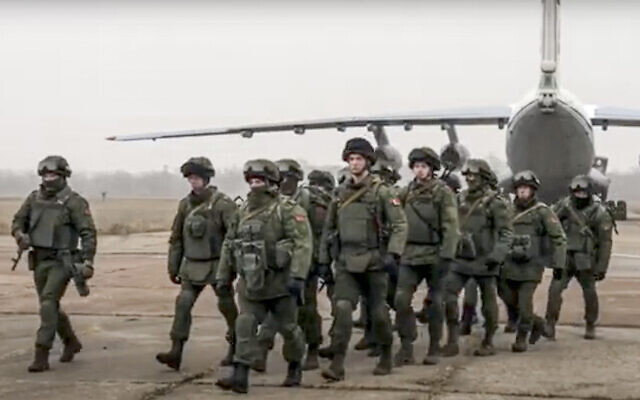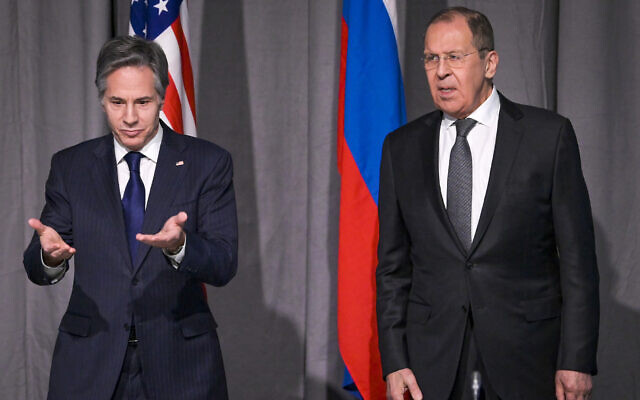Ex-official predicts protests likely ‘to accelerate Putin’s desire to do something’ in Ukraine, but lawmaker says Moscow lacks ‘the capability of handling 2 crises simultaneously’
Today, 12:54 am

In this handout photo released by Russian Defense Ministry Press Service, Belarusian peacekeepers leave a Russian military plane at an airfield in Kazakhstan, January 8, 2022. (Russian Defense Ministry Press Service via AP)
WASHINGTON (AP) — Russia’s decision to send paratroopers into Kazakhstan, where a crackdown on violent anti-government protests has left dozens dead, injects additional uncertainty into upcoming talks over a possible Russian invasion of Ukraine.
The question is whether the unrest in Kazakhstan has changed the calculations of Russian President Vladimir Putin as he weighs his options in Ukraine. Some say Putin may not want to engage in two conflicts at the same time, while others say Russia has the military capacity to do both and he will decide separately on whether to attack Ukraine. The instability in Kazakhstan may even add new urgency to Putin’s desire to shore up Russia’s power in the region.
Both Kazakhstan and Ukraine are former Soviet republics that Putin has sought to keep under Moscow’s influence, but so far with vastly different results. Ukraine, an aspiring democracy that has turned decisively toward the West, has been locked in deadly conflict with Russia since Putin seized Crimea in 2014 and backed an insurgency in the eastern Donbas region. Kazakhstan, meanwhile, has been ruled in the three decades since the Soviet collapse by autocrats who have maintained close security and political ties with Russia.
Russian troops entered Kazakhstan on Thursday after Kazakh President Kassym-Jomart Tokayev invoked the help of a Russia-led military alliance. The following day, with Russian troops helping to restore control over the airport and guarding government buildings, he ordered his forces to shoot to kill any protesters who don’t surrender.
That led to Washington and Moscow exchanging new barbs on the eve of a week of meetings over Ukraine that begins with talks between senior US and Russian officials in Geneva on Monday.
Asked about Kazakhstan and Ukraine on Friday, US Secretary of State Antony Blinken said he would not “conflate these situations.”
“There are very particular drivers of what’s happening in Kazakhstan right now, as I said, that go to economic and political matters,” Blinken said. “What’s happening in there is different from what’s happening on Ukraine’s borders.
“Having said that, I think one lesson of recent history is that once Russians are in your house, it’s sometimes very difficult to get them to leave,” he added.
The Russian Foreign Ministry fired back with a statement that referenced past US wars and interventions in other countries. “If Antony Blinken is so into history lessons, here’s one that comes to mind: When Americans are in your house, it can be difficult to stay alive, not being robbed or raped,” the statement said.

US Secretary of State Antony Blinken, left, and Russian Foreign Minister Sergey Lavrov meet on the sidelines of an Organization for Security and Co-operation in Europe (OSCE) meeting, in Stockholm, Sweden, December 2, 2021. (Jonathan Nackstrand/Pool Photo via AP)
The US has for weeks warned that Putin has stationed troops near Ukraine with the possible intent to stage a new invasion. Putin is not believed to have moved significantly more troops toward Ukraine in the last several weeks, according to two people familiar with the latest assessments who were not authorized to speak publicly. But at least 100,000 Russian troops remain in positions where they could possibly strike parts of Ukraine, the people said.
In response, Washington and Kyiv have ramped up their cooperation on intelligence and security matters, the people said.
In exchange for easing tensions with Ukraine, Putin wants NATO to halt membership plans for all countries, including Ukraine. The US and NATO have rejected that demand.
Lawmakers and long time observers of Russia disagree on how the Kazakhstan situation may affect Ukraine.
Fiona Hill, former senior director for Russia and Europe at the US National Security Council, said she believed the violence in Kazakhstan “is probably going to accelerate Putin’s desire to do something” in Ukraine.
She said Putin may want to reassert dominance across the region by both shoring up the president in Kazakhstan and undermining Ukraine’s democratically elected leader, President Volodymyr Zelenskyy.
“The Russian circle around Putin, they really do want to teach the Ukrainians a lesson,” Hill said. “And they don’t shy away from killing lots of people or seeing lots of people get killed.”
She noted that while Kazakhstan is in Central Asia, the northern part of the country was settled by Russians and Ukrainians in Soviet times as part of the Virgin Lands campaign, and Russians see it “very much as part of their land and not just a kind of sphere of influence.”
“And so northern Kazakhstan … is being seen as an extension of Russia, just like Ukraine, Donbas and Belarus and all that industrial and agricultural complex,” said Hill, a senior fellow at the Brookings Institution.
In recent years, Russia has entered conflicts in other neighboring former Soviet countries to seize territory or bolster Moscow-friendly governments. In 2020, when protests broke out in Belarus over the reelection of longtime strongman Alexander Lukashenko, Russia stood by him during a brutal crackdown and offered to send troops. In 2008, Russia invaded Georgia and seized control of two separatist regions.
In Belarus and now Kazakhstan, Hill noted, there is growing frustration with Russian-backed elites and inequality, together with a growing sense of nationalism. Those factors are also present in Ukraine, while discontent is growing in Russia as well.
“This is deeply troubling for Putin because it shows that protests can get out of hand over social issues,” she said. “And that even if you marginalize the opposition and you look like you’re in charge, one day suddenly, you’re not.”
Some see Kazakhstan as also presenting an opportunity for Russia to consolidate its power regionally.
Fyodor Lukyanov, a leading Moscow-based foreign policy expert, said by stepping in with military force Moscow has made itself the “guarantor upon whose position further events depend.” He said the situation was similar to Armenia in 2020, when Russia sent peacekeeping troops after a war with Azerbaijan over the disputed Nagorno-Karabakh territory.
“This is not a final situation or a solution, but it provides an effective set of tools for the period ahead,” he wrote in a piece published Thursday.
With this happening on the eve of the talks with the US, “Russia has sent a reminder of its ability to make quick and unconventional military-political decisions to influence what is happening in parts of the world that are important for it,” Lukyanov said.
US Representative Mark Green, a Tennessee Republican who serves on the House Armed Services and Foreign Affairs committees, is among those who see the uprising in Kazakhstan as deterring Russia in Ukraine.
“I don’t see Russia with the capability of handling two crises simultaneously,” Green said. “I think it will deter their ability to wage a major conflict in Ukraine.”
A fierce critic of the Biden administration, Green said he supported Blinken’s public statements in support of Ukraine and his push for a diplomatic solution.
“If Blinken’s actions are matching his rhetoric, then they’re doing OK here,” he said.



@Reader I’ve read elsewhere that it dates from President Clinton’s bombing of Russian ally Serbia but I agree with you. On another sillier note, I thought it quite amusing that in the index summary on the left side of the screen, since no quote marks are delineated, it looks as though you are saying just the opposite since it reads, “I worry The Russian Federation is Not the USSR.” Very funny.
@Will James
The Russian Federation is NOT the USSR.
Before the Maidan in November of 2013 Russia was quite friendly toward the West.
Since then, the West has done everything to prove that it cannot be trusted, that it is an implacable enemy of Russia and seeks its destruction and demise.
Not surprisingly, Russia is trying to protect itself.
Personally, I think that the Cold War policy outlived itself but who am I to talk?
@Will James
This is not true unless you mean after WWII in which case the USSR defeated the “Aryan” army (which came to kill all the Jews and most of the Slavs in order to increase the “Aryans'” Lebensraum) and pushed that army back into Germany while clearing the Eastern Europe of the Nazi occupiers.
Of course, the USSR then ruled the Eastern Europe for as long as it could.
The EU was formed by Hitler after his armies overran the Western Europe, and it was preserved and ruled by the US after the war.
Is there a difference? Yes, of course. The Soviet bloc was formed by force of arms as tanks and soldiers occupied the countries in Russia’s neighborhood. The EU was formed through voluntary association that initially appeared to be innocent enough. However, as time has passed, various nations have recognized after signing on the dotted line that there’s no such thing as a free lunch. In exchange for accepting funding from the EU, they discovered, for example, that paragraph 18 on page 374 of the document they signed requires that they accept as many immigrants and refugees as the EU considers necessary. So, in retrospect it has become clear that the EU skillfully disguised itself initially, but over time its hegemonic ambitions have become increasingly clear. Unsurprisingly, its major opponents are the countries of Eastern Europe whose memories of being under the Russian boot as still vivid enough for them to recognize the stench of tyranny.
Somehow I don’t think the people of Georgia are going to especially cotton to the idea that their state is “the belly of the beast.” Not even the never-Trumpers there.
Is there a difference between the European states forming an alliance called the EU dominated by Germany and France to a lesser extent and Russia and its “near abroad” dominated by Russia?
You might argue that the EU consists of democracies who chose to align whereas the second group are not. As I understand it, the EU is not democratic and is run by bureaucrats and Georgia and the eastern two provinces of Ukraine and Kazakhstan all were happy to have Russia move in. I know its not a good analogy but it is a start. the EU screws Israel but Russia doesn’t in the same way and EU works with China and Iran.and other authoritarian regimes just like Russia does.
I worry that the world will long remember how quickly the USSR managed to reassemble itself during the brief Biden era.